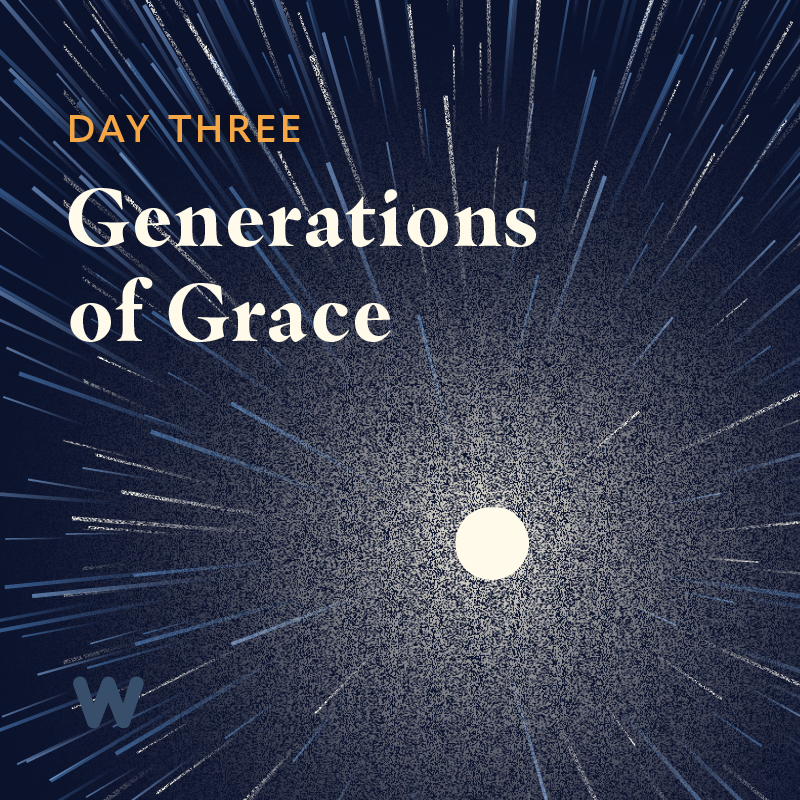Advent: Born to Dwell With Bible Study FellowshipSample


Grace Shatters our Status Quo
Today’s verses cover about 1,400 years of God’s constant covenant relationship with His sporadic, sinful people. In Genesis 12:1-3, God calls Abraham (known then as Abram) to a new life through a command and promise: “Go from your country, your people and your father’s household to the land I will show you. I will make you into a great nation, … and all peoples on earth will be blessed through you.” Matthew tracks God’s grace from Abraham forward, including names commonly recognized, such as Isaac and Jacob in verse 2, then David and Solomon in verses 6 and 7.
Early Jewish believers knew these men’s names by heart. However, Matthew’s list (which may seem boring to some of us) would have been unprecedented and record-shattering among its first readers. His revolutionary ancestry departs from Jewish tradition to include five women. What’s more—four of them are affiliated with Gentiles (non-Jews).
Matthew’s genealogy makes a case for God’s impartial grace. Old Testament genealogies almost never mentioned women. Before Christ, the hardness of men’s hearts meant women had inferior legal status to men.1 Old Testament Law recorded under Moses offered Jewish women more rights and protection than other ancient cultures. However, most men still regarded a woman as her father’s or husband’s possession in everyday practice.
Tamar
Genesis 38 tells the story behind Matthew 1:3. Tamar was a Gentile girl who married Judah’s oldest son, Er. He was so wicked that “the Lord put him to death.” (2). Another son’s sinful violation of ancient inheritance laws, along with Judah’s superstition and neglect, left Tamar in a desperate situation. When confronted with his sin, Judah acknowledged his wrong treatment of Tamar and repented, saying, “She is more righteous than I, since I wouldn’t give her my son Shelah.”
Rahab and Ruth
The books of Joshua and Ruth record the part of Jesus’ family story represented in Matthew 1:5. Joshua 2 tells us about Rahab, who’s identified as a prostitute. By grace, she hears about God and believes in Him. When Rahab encounters Hebrews spying in Jericho, she boldly confesses her faith in the one true God. Joshua 2:11 reports her testimony: “The Lord your God is God in heaven above and on the earth below.” Rahab jeopardizes her life to hide the spies. As promised, God rescues her from Jericho and gives her a place in the family line of the Messiah.
The book of Ruth tells her story. Ruth was also a Gentile, a foreigner to God’s people and ways. After an Israelite family comes to live in the land of Moab, the family’s sons marry Moabite women—Ruth and Orpah. Tragically, all the men in this family die, leaving three widows: the Moabites and their mother-in-law Naomi. Ruth faithfully pledges herself to God and Naomi, as recorded in Ruth 1:16: “Where you go I will go, and where you stay I will stay. Your people will be my people and your God my God.” Ruth eventually marries Boaz (named in Matthew and Luke’s genealogies). And Ruth becomes the great-grandmother to Israel’s greatest king, David.
Uriah’s Wife
2 Samuel 11 explains why Matthew intentionally refers to Solomon’s mother Bathsheba as the woman who “had been Uriah’s wife” in verse 6. King David commanded her to come to his palace, then committed adultery. When he learned that he had impregnated Bathsheba, he ordered the murder of her husband Uriah to conceal his adultery. The child conceived in adultery died. But David had taken Bathsheba as a wife, and she later gave birth to four sons, including Solomon, the future king.
Grace Greater than All Our Sin
God’s perfect story does not depend on the perfection of people but His perfect, gracious ways. Matthew’s genealogy of Christ illustrates God’s grace toward people of all nations and backgrounds. People’s flaws and failures never deterred the Savior’s coming to earth or His work. However, our life stories do help explain why He came. Like Matthew, do you agree that believing in Jesus is our only reasonable response to His sovereign, sacrificial grace?
Questions
- Matthew’s original audience knew Genesis 12:1-3 (included in the insights below). With this passage in mind, what does Matthew’s long list of names, which starts with Abraham, say about our promise-keeping God?
- Matthew 1:2-11 includes four women also written about in the Old Testament. Refer to their stories in Scripture or read the summaries in today’s notes. What does their inclusion in Matthew’s genealogy suggest about God?
- What kinds of people does God use to accomplish His plans, and what comforts or challenges come from knowing this truth about His relationship with people?
Related verses:
- Men’s hard hearts: Matt 19:8
- Er’s death: Gen 38:7
Scripture
About this Plan

What does Christmas mean to you? Spend 20 days recounting the Bible's Christmas story from Old Testament passages and the Gospels. Slow down, worship Jesus, and cherish Him by faith. Receive and rejoice in God's greatest gift. Jesus Christ is the Word made flesh to dwell among us. All who believe may be re-born to dwell with God now and forever.
More
We would like to thank Bible Study Fellowship for providing this plan. For more information, please visit: https://wordgo.org/
Related Plans

Men of the Light

Mom in the Word: One-Year Bible Plan (Volume 1)

Joyfully Expecting!

Elijah: A Man Surrendered to God

The Layoff Test: Trusting God Through a Season of Unemployment

Finding Joy

The Power of Biblical Meditation

God’s Word, Her Mission: Encouragement for Women Helping Build God’s Kingdom by Wycliffe Bible Translators

And He Dwelt
